Change Research/ CNBC Poll: August 7-9, 2020
Key Takeaways
- Biden leads 50% to 44% in the national poll and by 4 points across the 6 state battleground, including leads in every battleground state except North Carolina.
- Just 46% approve of Trump’s job performance in the battleground and only 44% approve of his handling of COVID-19, while a majority of battleground voters say COVID-19 is still getting worse.
- Despite the President’s executive action, voters in the swing states are split 50-50 over who would do a better job handling the economic recovery from COVID-19.
- Trump is prioritizing law and order, but racism and discrimination are higher priorities than crime, and Trump and the GOP don’t hold a clear advantage on crime or keeping communities safe.
- Battleground voters blame Trump and the Republicans in Congress as much as Democrats for the failure to pass an unemployment benefit expansion, but those who are currently on unemployment blame Trump and Republicans most.
- Almost half of parents report they are making long-term plans to deal with closed schools and daycare (48%) and as many say that there will be some impact on their ability to do their jobs and earn if schools do not resume in-person education this year (49%).
Biden and Democrats lead across the battleground
Biden leads by 4 points in our competitive battleground poll, up 1 point from our last poll. Biden continues to lead across the Rust Belt and Florida, but things are more competitive in Arizona and North Carolina where Trump and Biden are at parity. Biden leads by 6 points in the national ballot. That is down 3 points since we last surveyed, but Biden is still earning 50% of the vote.
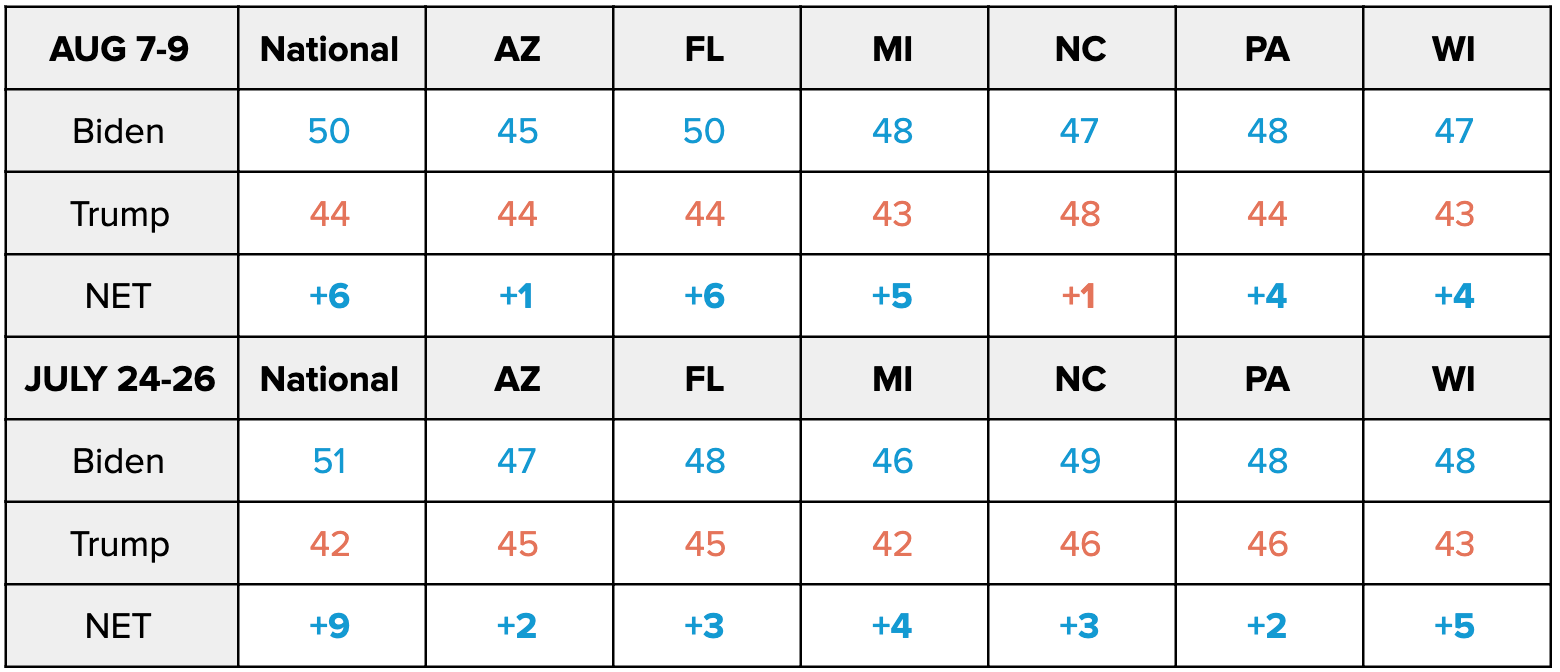
Democrats also maintain their advantages in the competitive Senate race states. Mark Kelly leads Martha McSally by 6 points (49% to 43%). Gary Peters leads John James by 3 points (48% to 45%). Finally, Cal Cunningham leads Thom Tillis by 5 points (48% to 43%).
Trump and the GOP are failing on COVID-19 and Democrats are competitive on the economy
Just 46% approve of Trump’s overall job performance in the battleground, matching his rating from the end of June. Trump’s handling of COVID-19 is worse than his overall job performance with just 44% approving of his handling of the pandemic in the battleground. By comparison, 6-in-10 voters approve of the job Dr. Anthony Fauci is doing and majorities approve of the way that all of the Democratic Governors are handling the pandemic. Though Doug Ducey’s approval on COVID-19 has improved over the past 2 weeks, he and Ron DeSantis, Republican Governors in Arizona and Florida, are actually earning marks even worse than Trump on the issue.

Trump is not only unable to turn around opinions of his handling of this crisis, but he is also not getting positive grades on the economy or helping people’s pocketbooks. The only area of the economy where Trump receives positive marks is the stock market, which the public does not consider reflective of the real economy as our past surveys have shown.
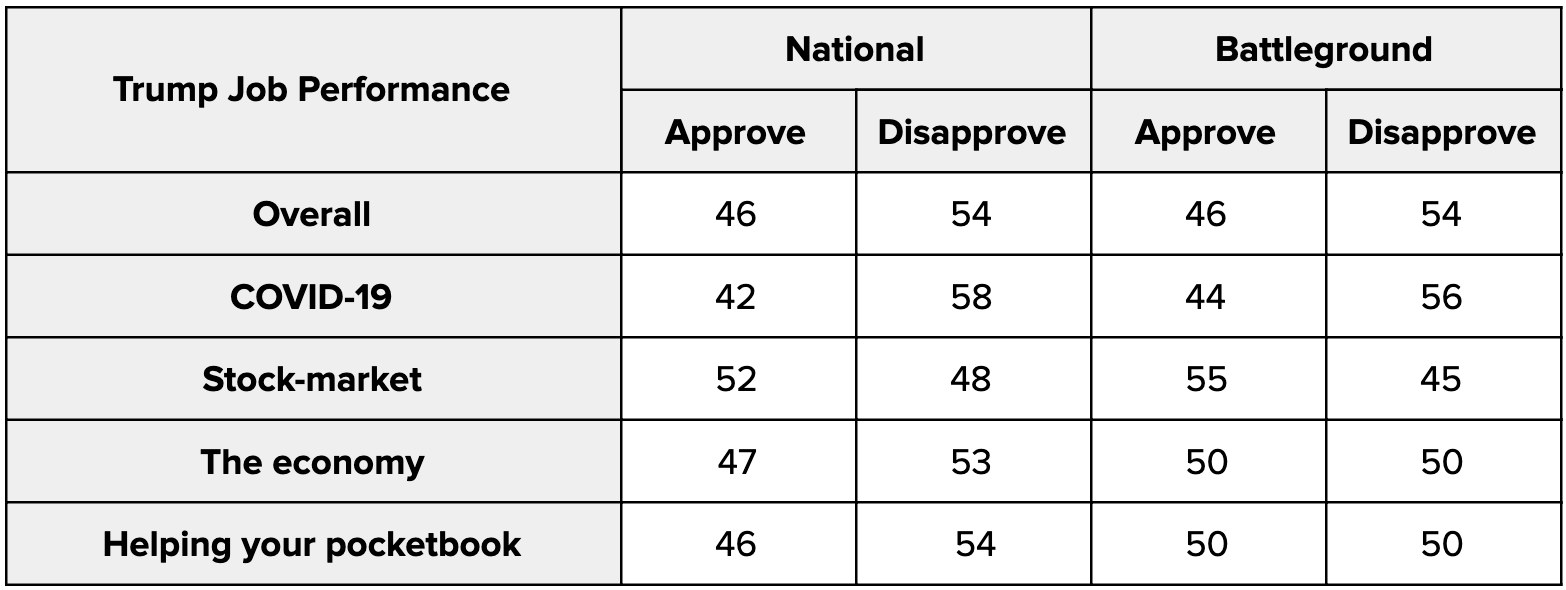
There will, of course, be a choice in this election, so we also ask voters who they trust more to handle these and other important issues. Nationally, voters prefer Biden and Democrats on every issue tested in this battery; there is a more mixed picture in the competitive battleground, as one would expect.
Who will do a better job of handling COVID-19 remains the central question given our country’s inability to stop the spread of the virus. Battleground voters continue to express their preference for Biden and Democrats when it comes to handling COVID-19. That is particularly true in Florida where 55% prefer Biden and Democrats. They also continue to trust Biden and Democrats more to make healthcare more affordable. Health care costs were issue #1 prior to the pandemic and the subsequent economic crash, and they remain the third most cited issue in a forced choice of important issues.
The other top issue is the economy. Trump has been pushing to get people back to work – often before states have met the criteria set out by his administration – and he continues to lead on the question of who would do a better job of getting people back to work in the battleground. When it comes to the economic impact of COVID-19, voters are evenly divided over who would do a better job. The Trump team likely hoped to get more mileage out of the Executive Orders announced as we entered the field.
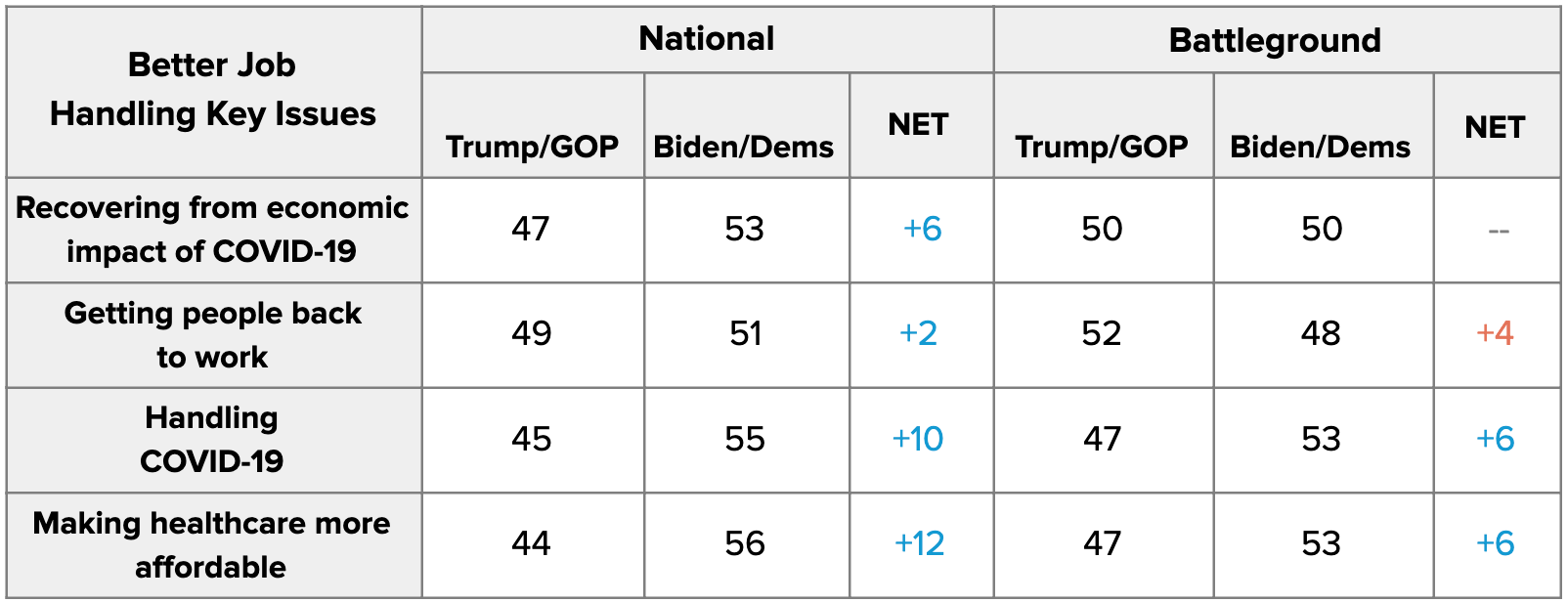
The Trump Strategy
The Trump campaign has signaled their intention to make two major issues central to his case against Joe Biden: China and crime.

Specifically, Trump has aligned himself with police departments and suggested more crime and worse policing under Biden and Democrats. Battleground voters do have favorable opinions of their local police departments (+57 favorable), and that includes African American voters (+31 favorable). But voters do not see crime as a major issue facing our country right now. In the battleground states, only 16% say crime is a top three issue. It is not even one of the top three most important issues for base Republicans (29% select as a top three issue). The issue of racism and discrimination, on the other hand, is the fourth most cited issue (29%) after the economy (51%), COVID-19 (46%), and health care and drug costs (34%). It is also the top issue among black voters (67%).
This is also not a winning issue for Trump and Republicans. In a better jobs battery we asked who would do a better job handling crime and who would do a better job keeping communities safe. Trump and Republicans were only leading on crime 51% to 49% while voters were evenly divided on who would do a better job keeping communities safe 50% to 50%.
Similarly, battleground voters are split 50-50 over who would do a better job handing China.
The state of the COVID-19 pandemic
A 69% majority of voters in the battleground and 71% nationally are seriously concerned about COVID-19, down 2 points in the battleground and 6 points nationally over the past two weeks . There has also been a decrease in the number saying that things are getting worse when it comes to the impact of COVID-19 over the past 2 weeks, but a 51% majority in the battleground continue to say things are worsening.
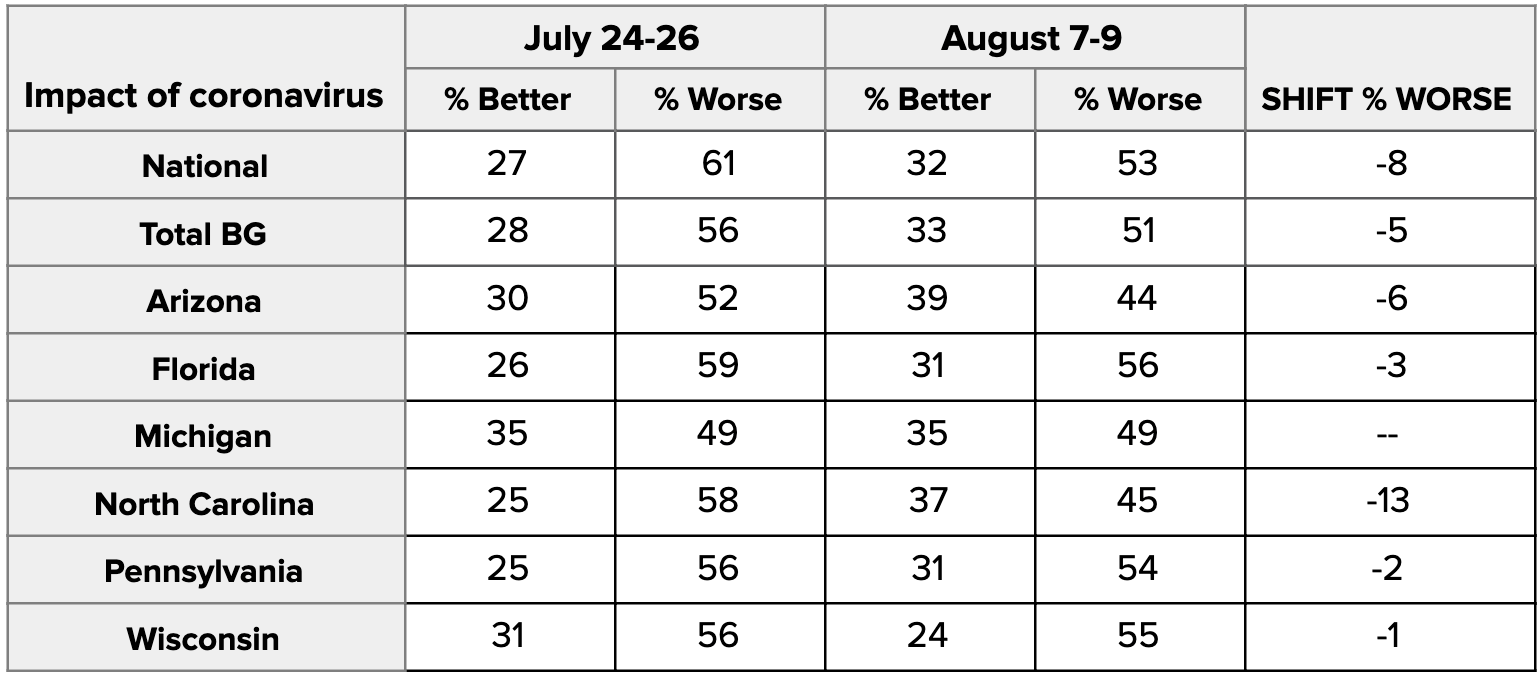
A majority of voters in Florida (55%), nearly half of voters in Arizona (49%), and 46% of voters in Wisconsin continue to say that things are opening too quickly there. (As a reminder, 58% of voters were satisfied with Tony Evers’ response to COVID-19, so concern that things are reopening too quickly there likely reflects the Republican legislature and state Supreme Court’s opposition to more social distancing measures.) But in the other battleground states voters are much less likely to say things are reopening too quickly, with North Carolina in particular dropping to just 25% saying so.
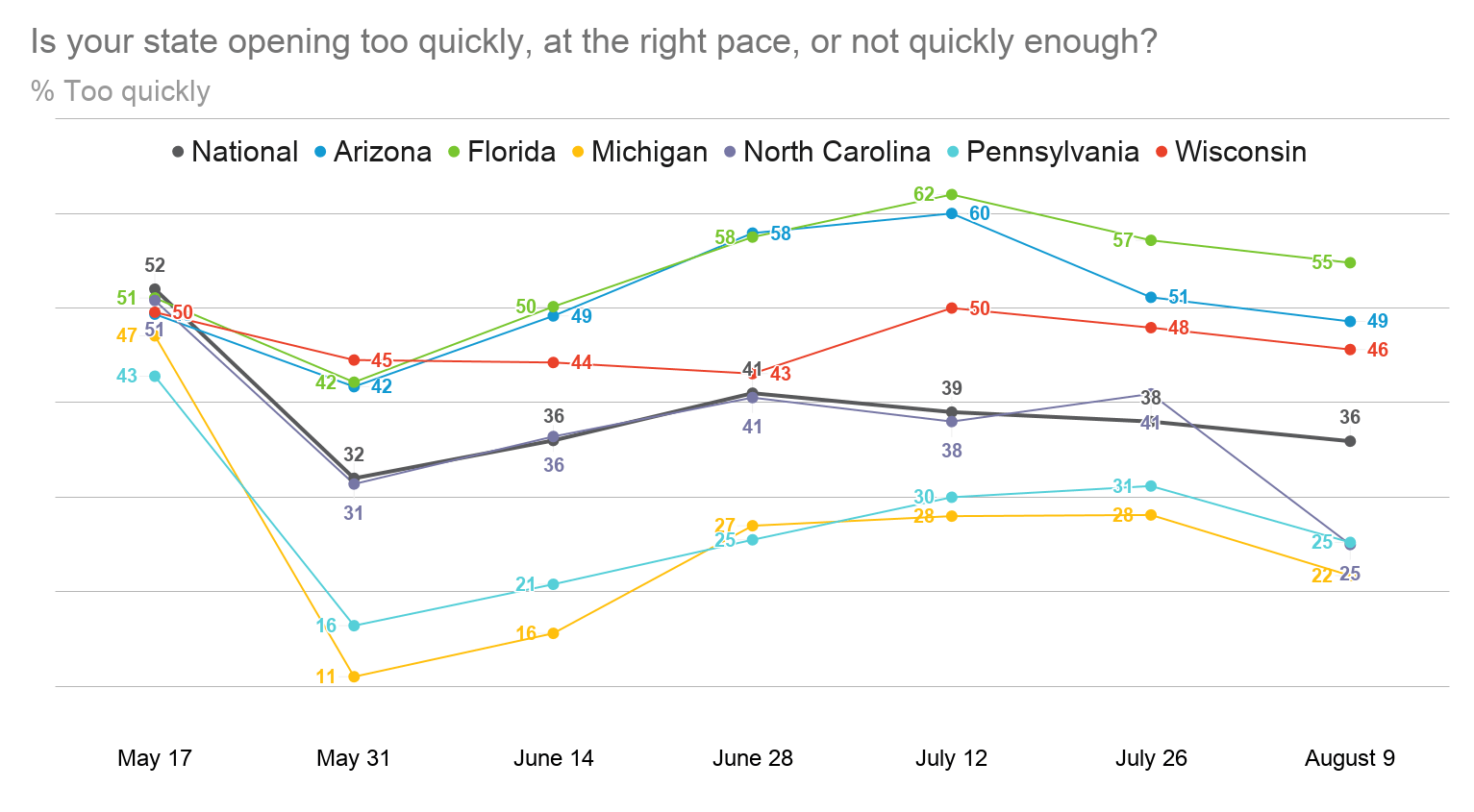
We also see the numbers saying that things are safe ticking up a few points across the battleground, but majorities still do not feel safe doing most activities.
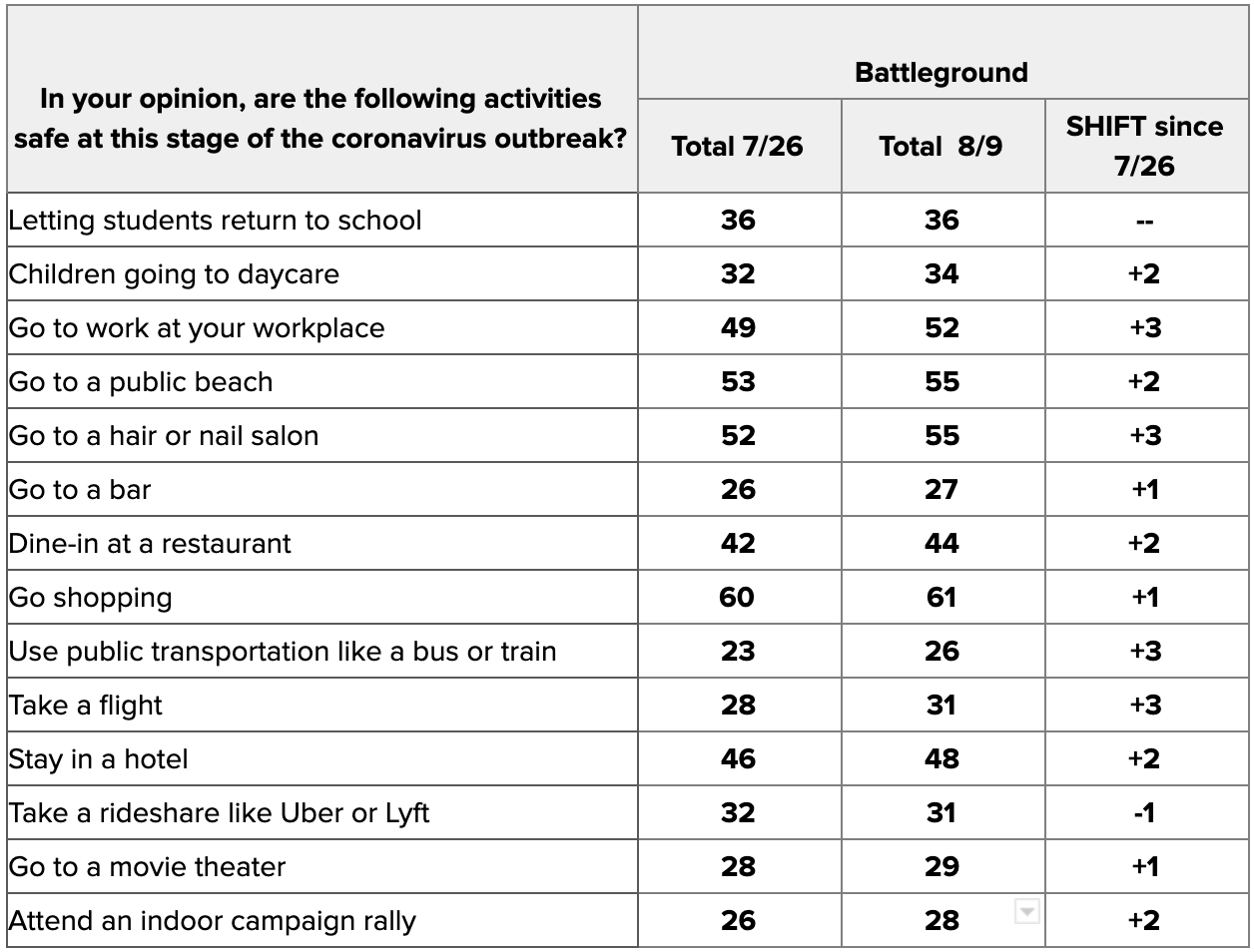
With people engaging in more activities, there has also been greater mask wearing. The number wearing masks in public climb has reached 86% nationally, making it as ubiquitous as hand washing (87%). In the battleground, 82% are wearing masks, driven down by Pennsylvania which continues to have the lowest mask-wearing rate (77%).
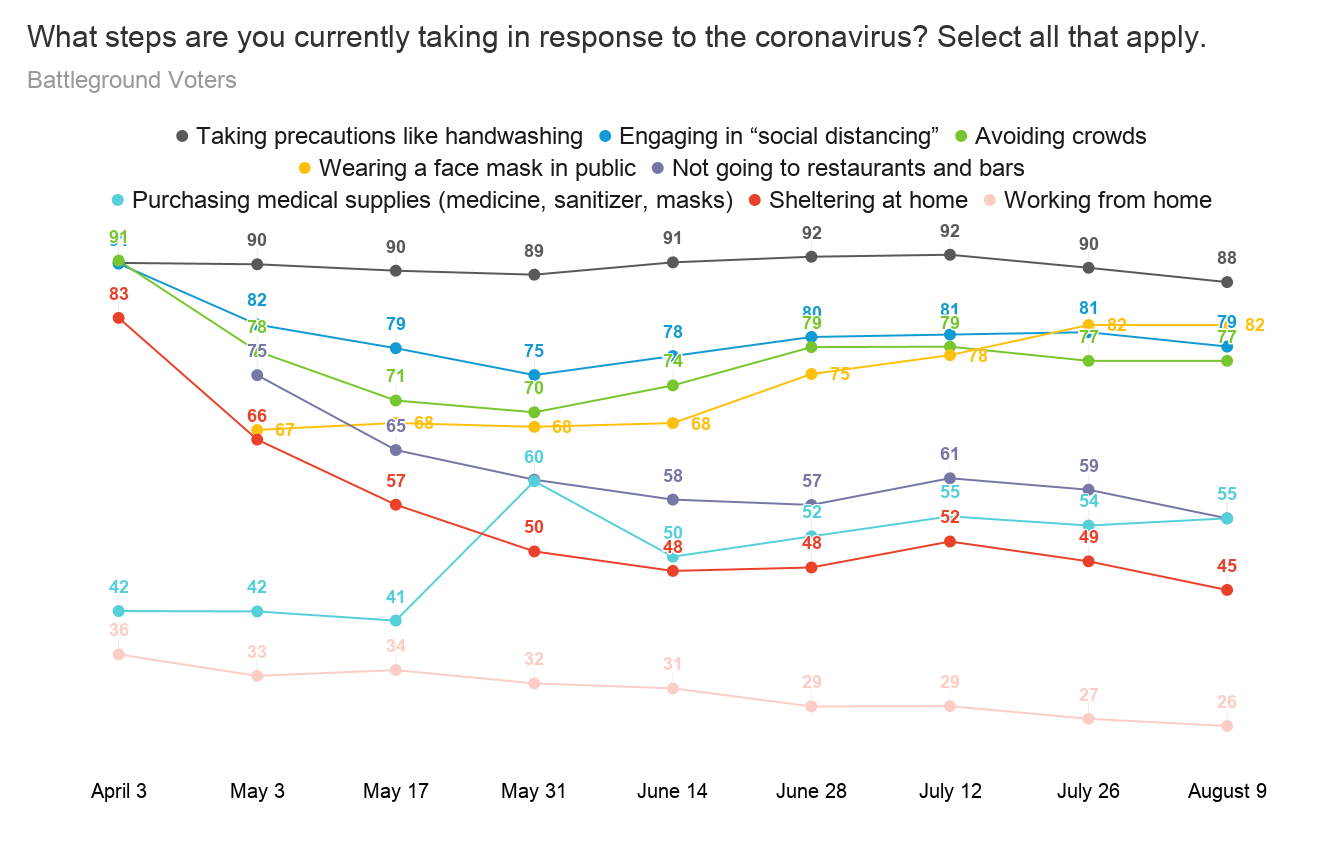
Schools and working from home
The number saying that it is safe for students to return to school has held steady at 36% over the last two weeks in the battleground, and just 33% of battleground voters say daycare is safe. Among parents in the battleground, 41% say that it is safe for children to return to school or attend daycare.
As the prospect of full or part time virtual learning this fall becomes real for many families, many working parents will be put in a difficult position. Almost half of parents report they are making long-term plans to deal with closed schools and daycare (48%) and as many say that there will be some impact on their ability to do their jobs and earn if schools do not resume in-person education this year (49%). That includes 36% of parents who say their job will be more difficult, 17% who say they will need to hire additional childcare, 17% who say they will need to work fewer hours, and 8% who say they will have to quit a job. Indeed 10% of parents say that they have already quit a job or are working fewer hours due to school closures from COVID-19.
Failure to act on economic relief for COVID-19
As COVID-19 continues, 22% of likely voters in the battleground are currently experiencing a job loss in their household, and 31% are currently experiencing lost wages. At the same time, 40% have spent money they were saving (including 49% of people who make under $50k a year), and 66% are experiencing increased prices for supplies at stores and online. Times are tough!
Meanwhile, Congress has failed to pass a new COVID-19 relief package, allowing the expanded federal unemployment benefits to expire. Voters in the battleground split the blame for this evenly between Donald Trump and Republicans in Congress (39%) and Democrats in Congress (40%), while 18% blame both equally. Of those who are currently experiencing lost wages in their household, however, voters are more likely to blame Trump and Republicans (49%) than Democrats (37%).
We also asked voters if an additional $400 in federal unemployment through the end of the year was not enough, too much, or just the right amount. A third of voters in the battleground believe that $400 is not enough, 31% believe it is about the right amount, and just 23% believe it is too much. But voters currently on unemployment benefits were clear in their need for more funds: 49% say that it is not enough and only 7% said it was too much.
Vote by Mail
Finally, we asked voters about how they plan on voting and their confidence in both mail-in-ballots and in-person voting. Nationally, 36% plan to vote by mail (62% of Democrats, 33% of independents and 10% of Republicans), 22% plan to vote in person before Election Day, and 28% plan to vote in person on Election Day. In the battleground 38% of voters plan to vote by mail (64% of Democrats, 36% of independents, and 14% of Republicans), 22% plan to vote in person before Election Day, and 36% plan to vote in person on Election Day, though there are significant differences by state.

Half of battleground voters say they are confident that their vote will be counted and their ballot will be secure if they vote by mail, including 80% of Democrats, 47% of independents and 18% of Republicans. At the same time 62% believe that it will be safe for people to vote in person on Election day (42% of Democrats, 62% of independents, and 85% of Republicans).
For media inquiries, please email [email protected]
Change Research conducted a poll of 2,701 likely voters August 7-9, 2020 across 6 competitive battleground states: Arizona, Florida, Michigan, North Carolina, Pennsylvania, and Wisconsin. A companion national survey of 2,143 likely voters was also conducted August 7-9, 2020. Unless otherwise stated, the results presented in this analysis are among battleground state voters. The margin of error, as traditionally calculated, is ±1.89% for the battleground and ±2.12% for the national poll. Change Research reaches voters via targeted online ads that point people to an online survey instrument. Our Dynamic Online Sampling establishes and continuously rebalances advertising targets across region, age, gender, race, and partisanship to dynamically deliver large samples that accurately reflect the demographics of a population. Post stratification was done on state, gender, age, race, education, and 2016 presidential vote.
This is the eleventh in a series of bi-monthly battleground state and national surveys that CNBC & Change Research will conduct in 2020.
